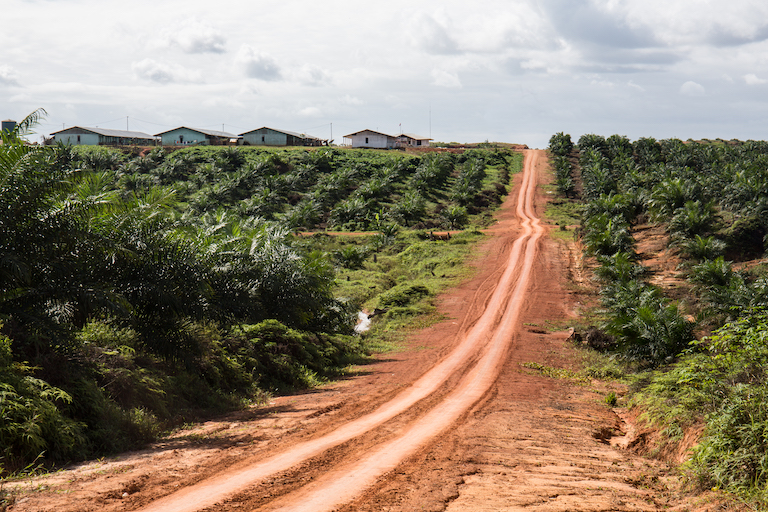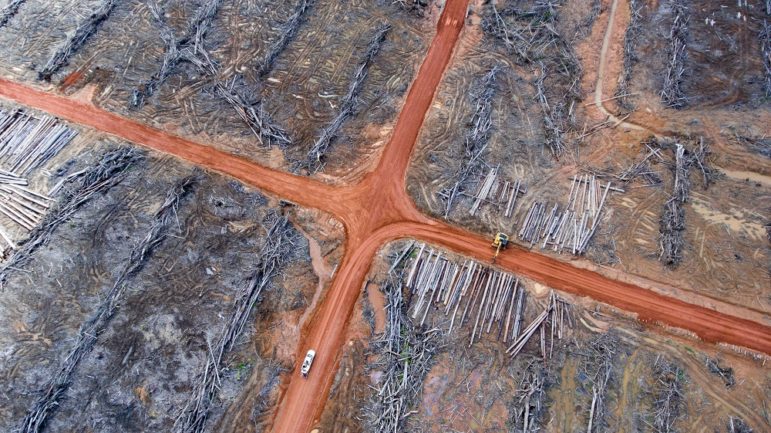
Korindo’s oil palm plantation in Getentiri, a village in southern Papua. Image by Albertus Vembrianto for Mongabay and The Gecko Project.
Mongabay has long reported on the status of Indonesia’s rainforests. Large-scale palm oil plantations continue to be one of the biggest drivers of illegal deforestation in this biodiverse region. A suspicious payment by one of the largest palm oil plantations there spurred a year-long investigation that led to greater transparency and accountability.
A $22 million mystery payment
Produced in collaboration with The Gecko Project, the Korean Center for Investigative Journalism, and Al Jazeera’s 101 East program, Mongabay investigated a $22 million “consultancy” payment connected to a major land deal in Papua, Indonesia.
The payment was made by one of the world’s largest palm oil companies, the Korindo Group, in connection with its acquisition of a land concession in Papua, home to Indonesia’s largest remaining stretch of intact rainforest and dozens of Indigenous communities. Permits have no official cost in Indonesia, so what could it possibly have been for? Mongabay and our partners aimed to find out.
Korindo was unable to offer a coherent explanation. It told conflicting stories to NGOs and our reporting team. We did, however, discover the identity of the “consultant” in Korindo’s financial statements: a Korean-Indonesian businessman named Kim Nam Ku. So we traveled to Papua to learn what he had been up to in one of Indonesia’s remotest regions.
Our report also examined the Korindo plantations’ impact on local communities, who say the company failed to keep its promises to improve their lives through jobs and development. It also sketched out the beginnings of a roadmap for how authorities in multiple jurisdictions, from Indonesia to Singapore and the U.S., could determine whether Korindo’s “consultancy” payment had in fact funded bribery.
Coupled with Mongabay’s investigation and ongoing reportage, a documentary, Selling Out West Papua, ran on Al Jazeera’s 101 East program, produced with Al-Jazeera, The Gecko Project, and the Korea Center for Investigative Journalism. Additionally, Mongabay reported on an independent investigation based on satellite imagery in late 2020. The external investigations concluded the Korindo Group deliberately set fires to clear a Chicago-sized area of rainforest in Papua.

Piles of trees being prepared for burning on land controlled by Korindo in Papua. Photo courtesy of Mighty Earth.
Real-world impact
Continuing to bring global awareness to the activities of the Korindo Group, Mongabay and other media attention had a significant impact on anti-corruption in Southeast Asia and worldwide. Upon publication of the investigation, Mongabay was asked to provide insight to help inform anti-corruption organizations in the region and shortly after, the deputy chairman of the Indonesian Parliament’s Commission IV launched an investigation into Korindo’s activities.
By July 2021, Korindo was stripped of its membership with the Forest Stewardship Council (FSC) timber certification body. The announcement came after the FSC and Korindo Group couldn’t agree on how to verify the company’s compliance.
The investigation was a finalist in two categories of the 2021 Online Journalism Awards: the “Knight Award for Public Service” and “Excellence in Collaboration and Partnerships.” Additionally, Al Jazeera’s “Selling Out West Papua” video and “The $5 Forests” infographic – both outputs from the collaborative investigation with Mongabay – won numerous awards, including the Gold award at the Venice TV Awards in the category of Cross Platform Programming, the Print/Online Media category award from the Amnesty International Media Awards, and the Whitman Bassow Award from Overseas Press Club for the “Best reporting in any medium on international environmental issues.”
Support independent environmental journalism
If you are interested in helping shed light on conservation stories such as this one, there are two excellent ways you can do so with Mongabay. First, consider making a donation, which directly helps us continue to produce high impact journalism from nature’s frontline. Second, subscribe to Mongabay’s newsletter to get the latest environmental news delivered right to your inbox.
About Mongabay
Mongabay is a nonprofit environmental science and conservation news platform focused on providing cutting-edge independent journalism from nature’s frontline. We pride ourselves in producing reporting that has substantial, tangible impacts around the world.